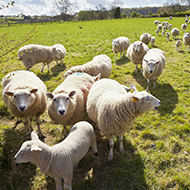
Researchers to develop tools to drive uptake of Precision Livestock Farming (PLF) technologies.
A research consortium has been awarded government funding to develop new tools to encourage the adoption of ‘smart technology’ in UK sheep flocks.
The research consortium - which includes Scotland's Rural College (SRUC), Synergy Farm Health, 5 Agri, Nighthawk Software, LSSC Ltd, Datamars Livestock and Elanco Animal Health – aims to develop user-friendly tools to drive the uptake of Precision Livestock Farming (PLF) technologies on sheep farms.
Led by the Moredun Research Institute, the ‘Smart Sheep Project’ will work with focus farmers to validate and implement the tools to embed PLF methods in the UK sheep industry.
Dr Fiona Kenyon, principal investigator at Moredun and Smart Sheep Project leader, commented: “We are delighted to be successful with our funding application to take forward the project and deliver innovative solutions which will enable sheep farmers to increase their productivity and profitability.”
One PLF Method that researchers are hoping to develop is Targeted Selective Treatment (TST) a method that utilises the sheep's electronic identification tag to identify underperforming lambs. The method uses an algorithm so they may be singled out for treatment, optimising the worming process.
TLT uptake is currently hampered by a lack of a user-friendly method for farmers to access the required algorithm. The Smart Sheep Project aims to facilitate the integration of this algorithm into a cloud-based platform while engaging with farmers and advisors to co-design the tools that will allow for easy access.
The platform will be tested on sheep farms across the UK, covering a variety of locations and breeds. Researchers will undertake a cost/benefit analysis and scrutinise the carbon footprint of the new approach, with the results to be shared at on-farm events across the UK.
Dr Claire Morgan-Davies, a systems researcher at SRUC’s Hill & Mountain Research Centre, said: “Until fairly recently, technological innovation has been seen as only relevant to low ground arable and dairy farming systems. But the use of precision livestock farming, as we call it, is just as relevant in upland areas, if not more so.”
She added: “Such innovations can help increase the economic viability of hill farming and crofting by ensuring that individual animals are managed according to their individual health and welfare needs.”
Funding for the project was awarded by the government’s Transforming Food Production Challenge Fund through Innovate UK.



 The Veterinary Medicines Directorate (VMD) is inviting applications from veterinary students to attend a one-week extramural studies (EMS) placement in July 2026.
The Veterinary Medicines Directorate (VMD) is inviting applications from veterinary students to attend a one-week extramural studies (EMS) placement in July 2026.